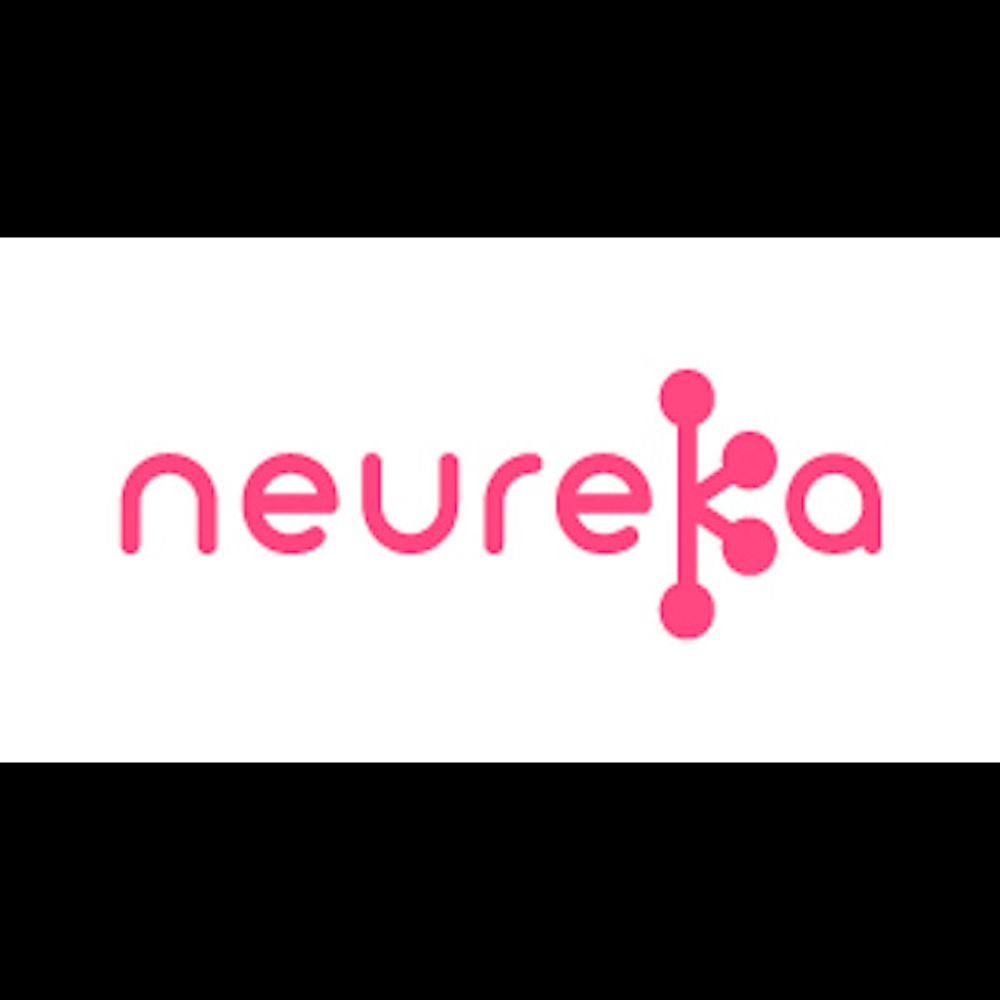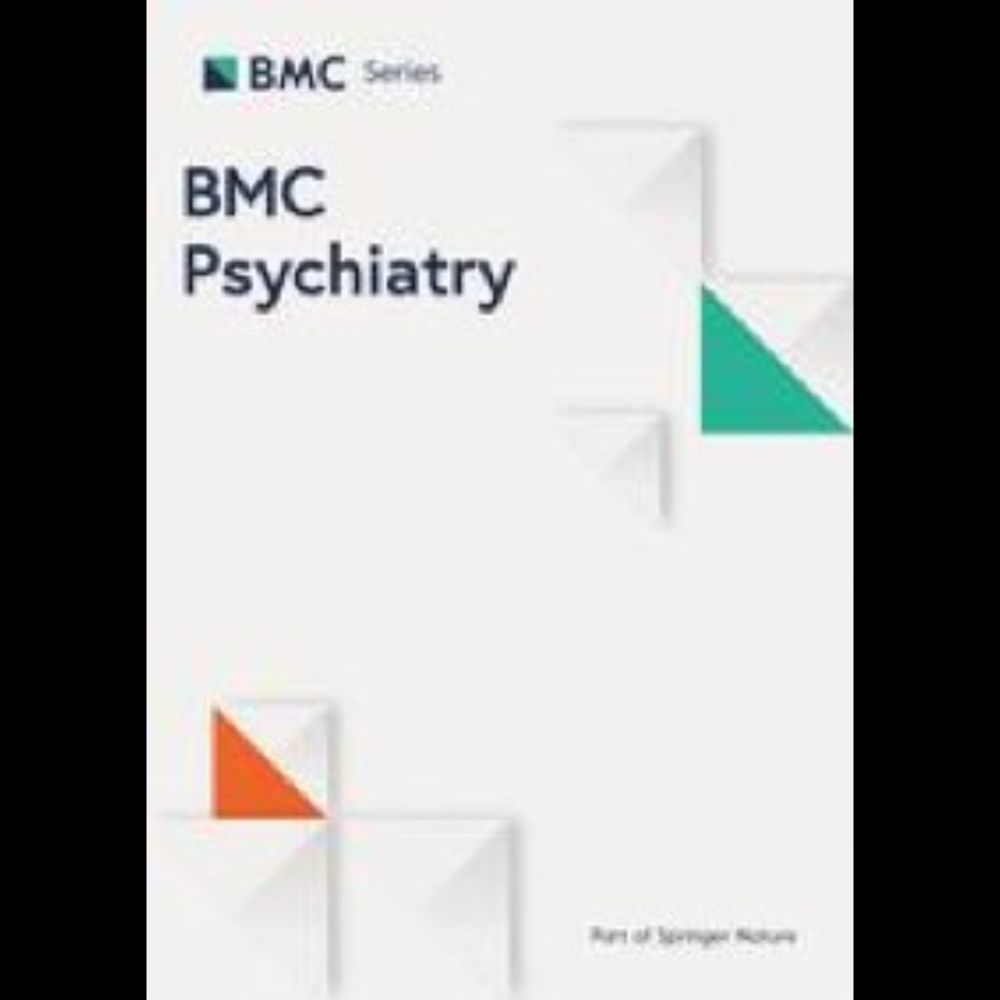OSF
Interested in the structure of psychopathology? We have a new preprint for you osf.io/preprints/ps... led by @celinef.bsky.social "Mechanistic arbitration between candidate dimensions of psychopathology"
01.08.2024 13:20 — 👍 21 🔁 15 💬 1 📌 1
9/10 A massive thanks to my fantastic co-authors and collaborators, including @kellydonegan.bsky.social 🌟, especially the #Neureka team who gathered all of this wonderful data, our funders and my supervisor @clairegillan.bsky.social 🙏
27.11.2023 12:50 — 👍 1 🔁 0 💬 1 📌 0
8/10 Meta Mind exemplifies how to adapt established cognitive tasks for within-person, longitudinal assessments, facilitating the development and testing of causal models 🔄.
27.11.2023 12:49 — 👍 0 🔁 0 💬 1 📌 0
7/10 The high reliability observed may suggest that hybrid ‘self-report-cognition’ 🤝 tasks may be overall more reliable than behaviour-only assessments and thus be one way to bridge the reliability gap in computational psychiatry 🌉.
27.11.2023 12:47 — 👍 1 🔁 1 💬 1 📌 0

6/10 Metacognitive biases in decision-making are highly stable within-session, exhibit strong reliability 💪 and associations with clinical correlates are evident in as few as 40 trials, facilitating the rapid 🏃♀️ detection of individual differences in metacognition
27.11.2023 12:46 — 👍 0 🔁 0 💬 1 📌 0
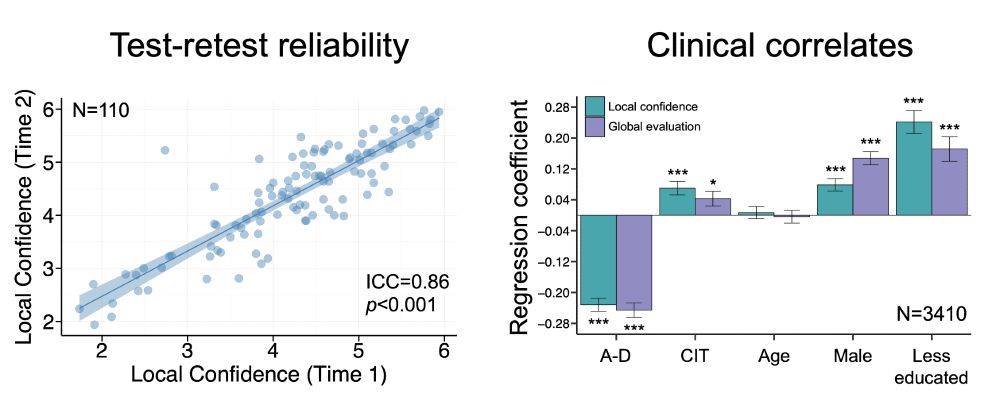
5/10 We additionally observed high test-retest reliability with Meta Mind and replicated previously established associations with psychiatric dimensions 📈 in our very large sample of citizen scientists 🧑🔬
27.11.2023 12:44 — 👍 0 🔁 0 💬 1 📌 0
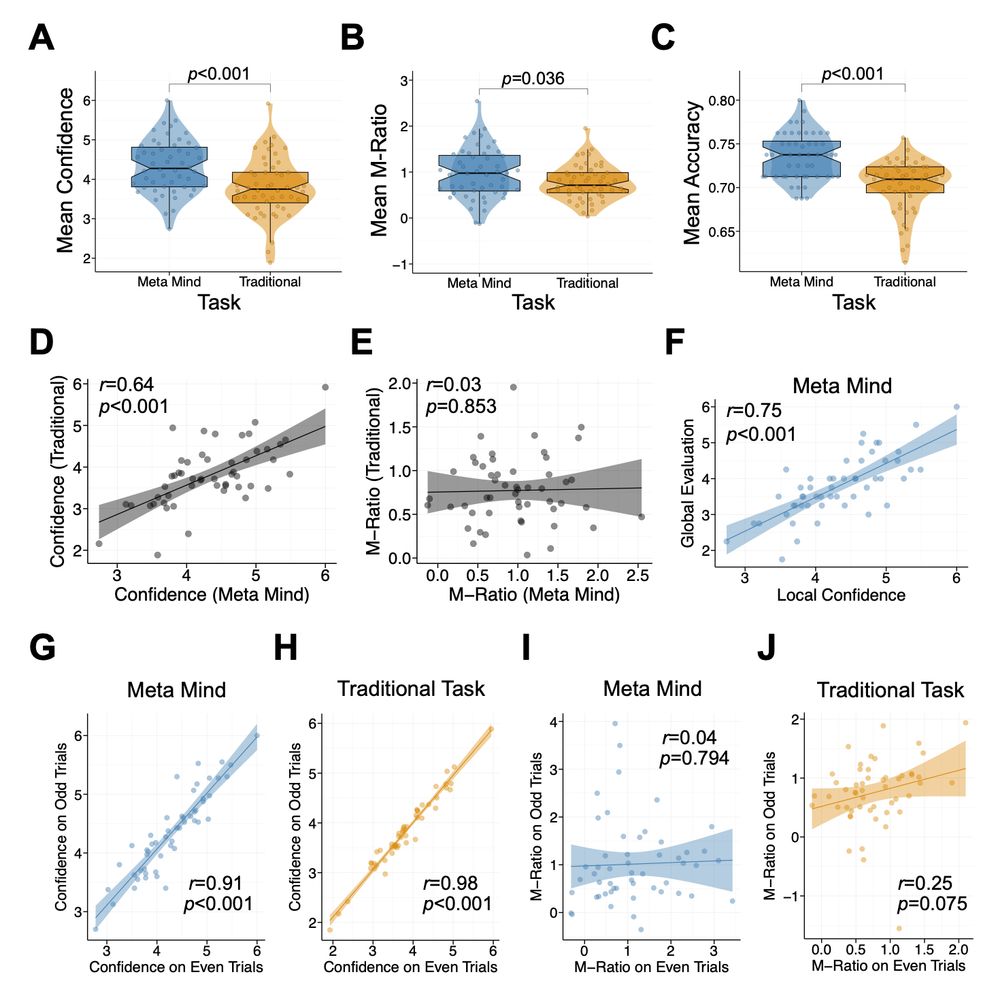
4/10 Relative to the traditional task, we demonstrated the convergent validity and excellent split-half reliability of metacognitive bias in Meta Mind ✅. In contrast, metacognitive efficient was neither valid nor reliable ❎ with Meta Mind (likely due to low trial N < 100).
27.11.2023 12:43 — 👍 0 🔁 0 💬 1 📌 0
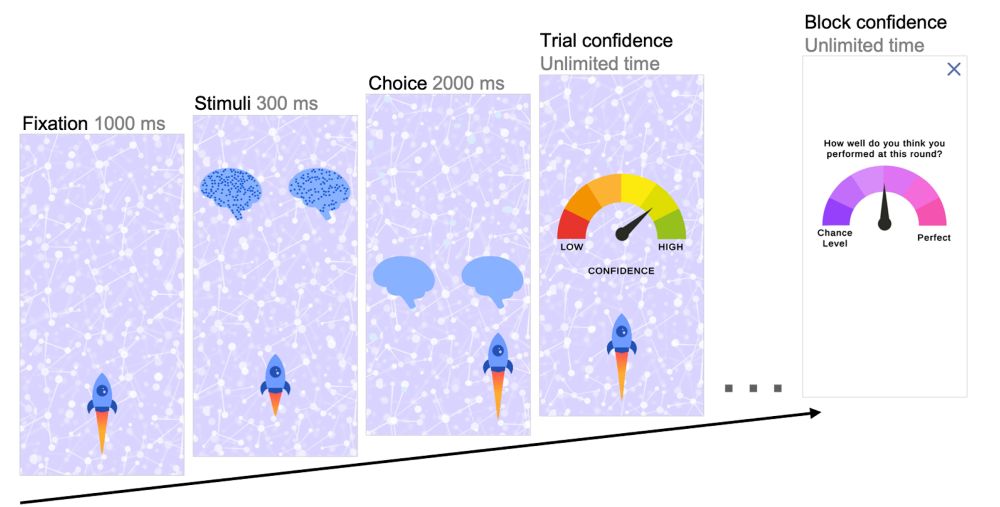
Meta Mind game design
3/10 To achieve this, we developed Meta Mind 🧠, a gamified smartphone task 🤳 designed to measure metacognitive (confidence) bias and investigated its psychometric properties against a traditional metacognitive task
27.11.2023 12:42 — 👍 0 🔁 0 💬 1 📌 0
2/10 While metacognitive disturbances have been reported across various aspects of mental health 🙇♀️, most research has been cross-sectional. The next frontier is a shift towards repeated assessments of metacognition in individuals over time ⏰, through treatment 💊, and in real world environments 🌍
27.11.2023 12:39 — 👍 0 🔁 0 💬 1 📌 0
📢 Delighted to share the second preprint of my PhD work! 🎉
Across 2️⃣ experiments (N=3410 unpaid citizen scientists, N=52 paid participants), we developed a new smartphone game 📱👾 to measure metacognition 🧠 reliably, rapidly and remotely over time
osf.io/preprints/ps... … 1/10
27.11.2023 12:37 — 👍 16 🔁 10 💬 1 📌 0

We are recruiting a new PhD student to work on an exciting new area in our lab - developing passive smartphone 📱proxies for cognition and symptoms with lots of cool data science methods and a clinical focus on psychotic like experiences in the gen. pop. gillanlab.com/join-the-lab/
22.11.2023 16:02 — 👍 11 🔁 17 💬 1 📌 1
9/9 Lastly, a massive thanks to my other fantastic co-authors and collaborators, especially the PIP study team who gathered all of this wonderful data 🌟 and my supervisor @clairegillan.bsky.social, and our funders 🙏
22.11.2023 12:04 — 👍 1 🔁 0 💬 0 📌 0
8/9 This is important because it suggests that negative biases in anxious-depression are not fixed or final, they can change through time or through treatment.
22.11.2023 12:02 — 👍 0 🔁 0 💬 0 📌 0
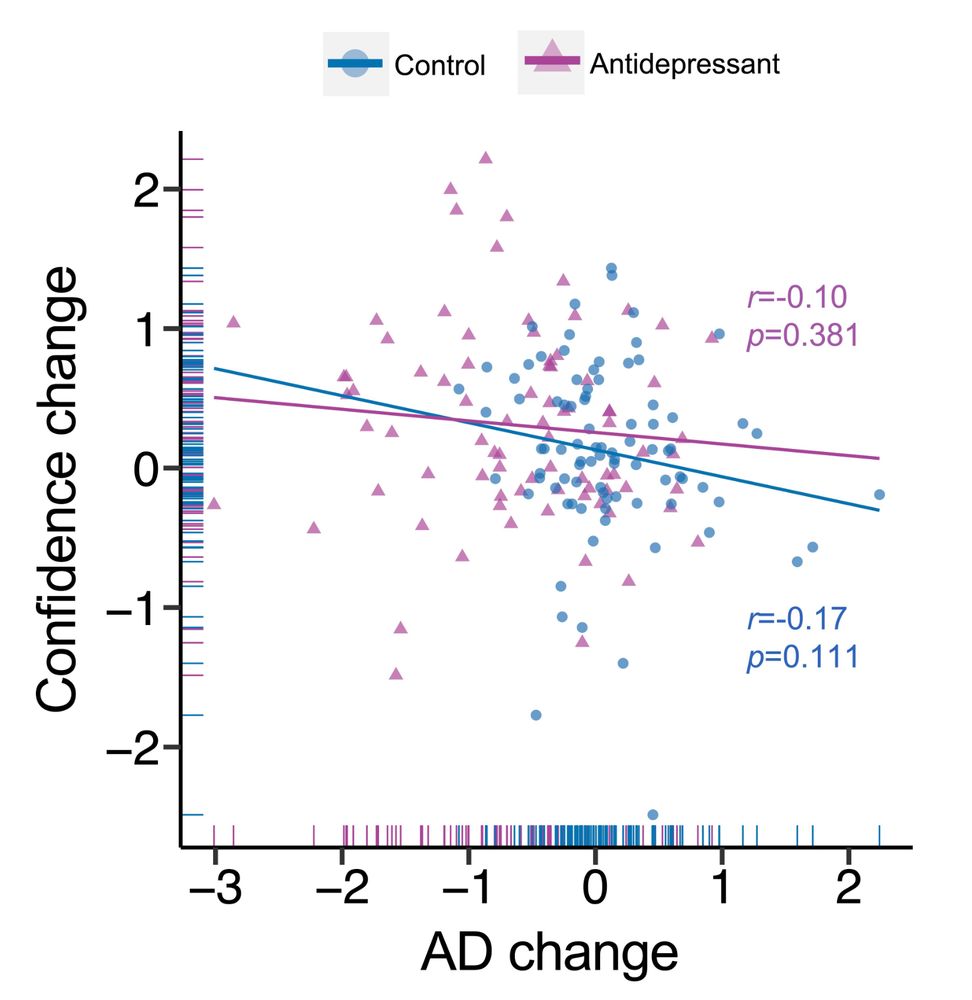
7/9 Though these samples are too small for individual difference estimates, we note a general pattern across all arms, where changes in confidence over time track changes in anxious-depression. We think this suggests metacognitive biases in anxious-depression are state-dependent.
22.11.2023 12:02 — 👍 0 🔁 0 💬 0 📌 0
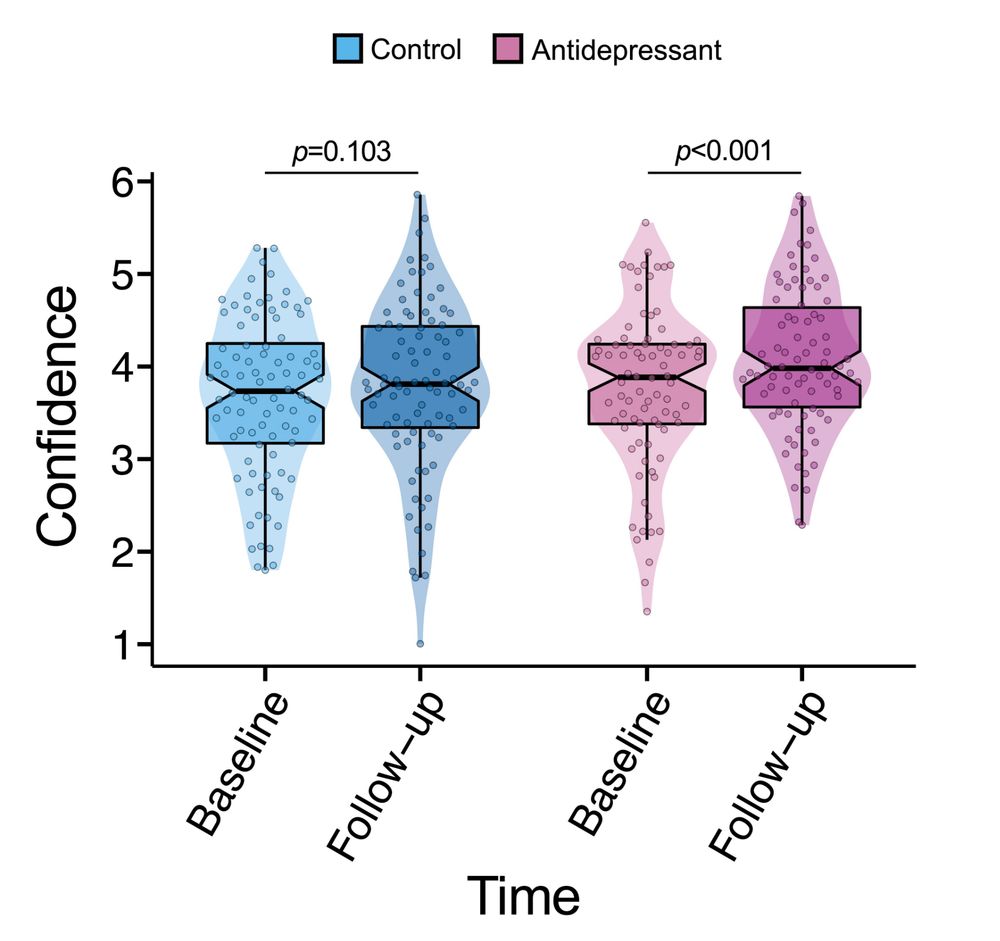
6/9 Among patients starting antidepressant medication 💊 (N=82) and a control group receiving no intervention 🙅♂️ (N=88), we found a significant increase in confidence in the antidepressant arm, but not among controls. Caveat, the interaction is p=0.06 🙃.
22.11.2023 12:01 — 👍 0 🔁 0 💬 0 📌 0
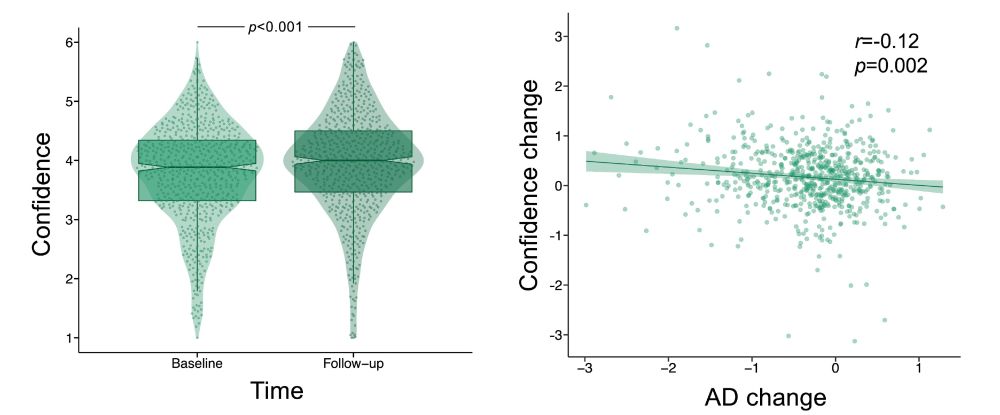
5/9 Turning to changes over time – anxious-depression significantly reduced after 4 weeks of iCBT 📉, and this was accompanied by an increase in confidence 📈. Importantly, those with the greatest reductions in anxious-depression levels had the largest increase in confidence.
22.11.2023 11:59 — 👍 0 🔁 0 💬 0 📌 0
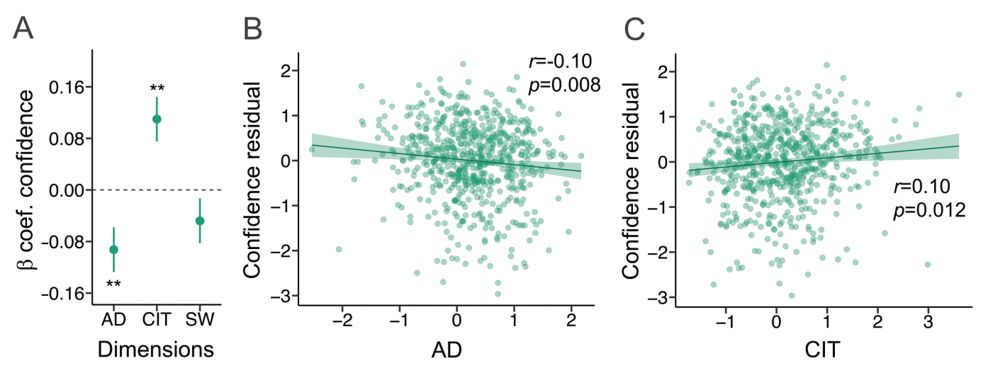
4/9 Prior to receiving iCBT, ‘anxious-depression’ was associated with under-confidence, while ‘compulsive and intrusive thoughts’ was associated with over-confidence in performance, replicating 🔄 previous work and extending it to a new sample - treatment seeking patients.
22.11.2023 11:58 — 👍 0 🔁 1 💬 0 📌 0
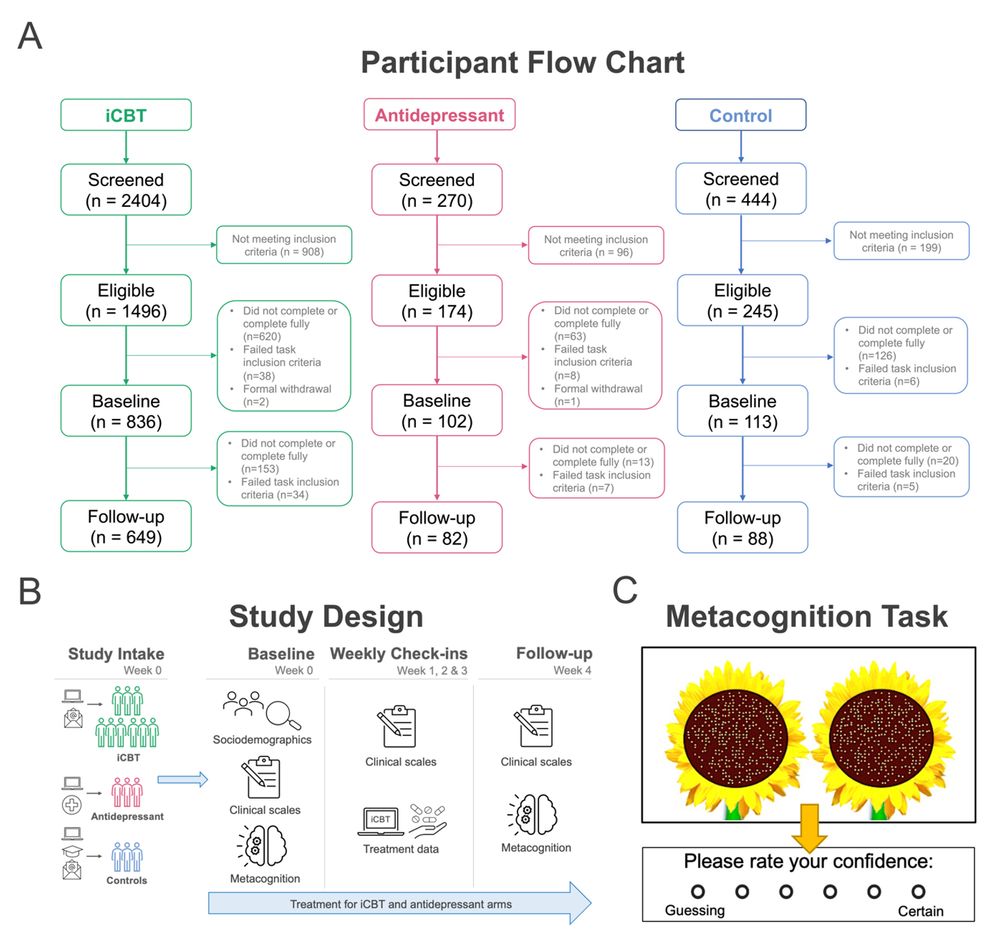
3/9 They signed up online and completed a metacognitive task and self-report questionnaires at baseline and 4-week follow-up, without ever meeting us 🧑💻
22.11.2023 11:57 — 👍 0 🔁 0 💬 0 📌 0
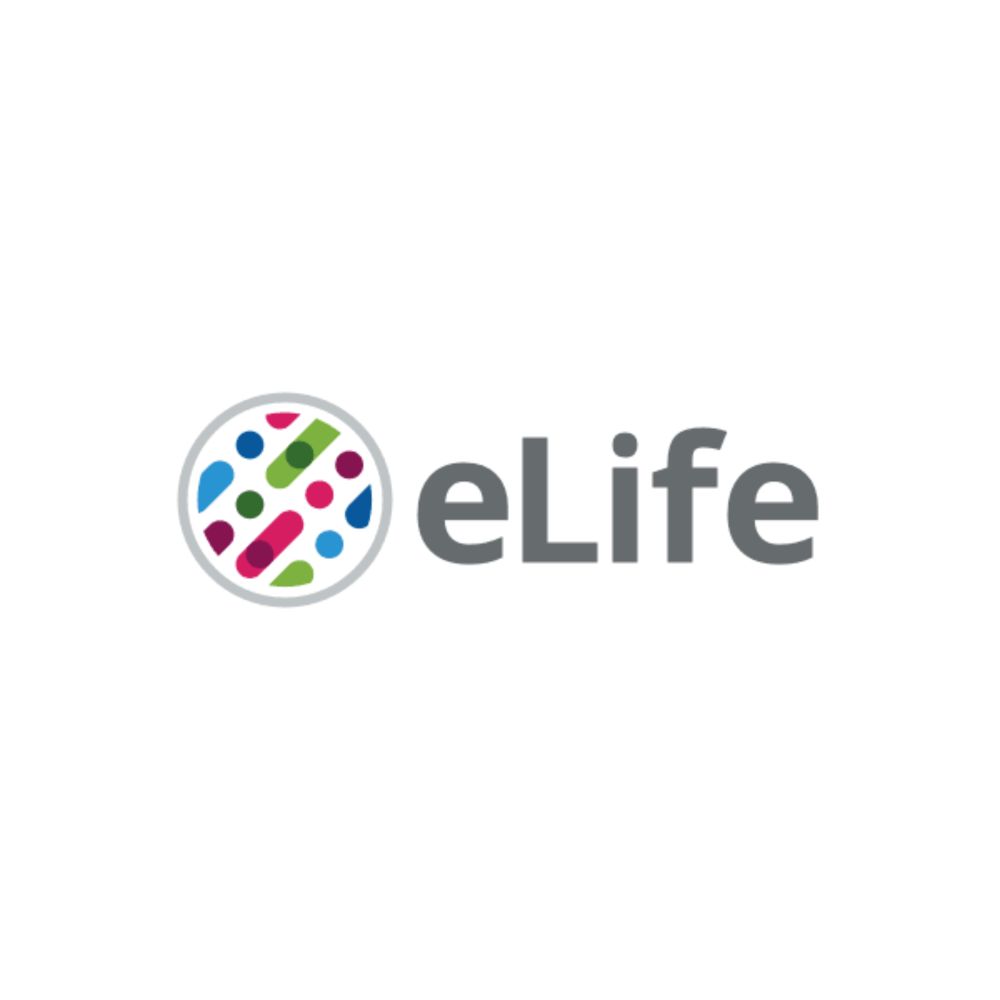
An observational treatment study of metacognition in anxious-depression
Improvement in levels of anxious-depression corresponds with increased confidence in performance among individuals receiving mental health treatment within a large longitudinal dataset.
🚨 🗞️ Excited to share our new study is now published in eLife! @elife.bsky.social
We tested the state-dependence of metacognition 🧠 among N=649 before and after 4 weeks of iCBT 🧑💻, along with a smaller antidepressant arm 💊 and a control group..
elifesciences.org/articles/87193 …a 🧵 1/9
22.11.2023 11:53 — 👍 23 🔁 10 💬 9 📌 0
Thanks Micah! Glad you enjoyed, looking forward to chatting with you when you visit us in the new year!
22.11.2023 09:59 — 👍 1 🔁 0 💬 0 📌 0
Postdoc in Cognitive Neuroscience at University of Oxford
Postdoc @ NYU
Studying perinatal health and child neurodevelopment 🧠
Options my own!
Director of the Interacting Minds Center
@interacting-minds.bsky.social
Professor, Department of Clinical Medicine/School of Culture & Society
Aarhus University, Denmark
Neuroscientist studying human beliefs & the social brain. she/her/hers. Professor of Psychiatry & Data Science@Yale
Lab: https://www.neurocpu.org/
Conference: https://www.cpconf.org/
Journal: https://cpsyjournal.org/
Research Fellow at the Applied Computational Psychiatry lab at UCL
Professor of Neuroscience and Mental Health, UCL Institute of Cognitive Neuroscience
Postdoctoral Researcher in the Cusack Lab at Trinity College Dublin
| Passionate about Neuroscience and AI, infant and machine learning 💡
Prof Redmond O'Connell's lab, Trinity College Institute of Neuroscience. Seeking to understand the neural mechanisms underpinning high-level cognition.
https://oconnell-lab.com/home/opportunities/
Clinical and Cognitive & Computational Psych PhDing @EmoryUniversity l Perseverative thought, mental effort, and motivation l she/her
Assistant Professor at Emory Psychology || Computational clinical science of depression and anxiety || translational-lab.com
Sir Henry Wellcome Postdoctoral Fellow @ Max Planck UCL.
Machine Learning Engineer at Limbic
Building AI therapy
Previously, Max Planck Centre for Computational Psychiatry @ UCL
Data Scientist at Mindstep ✨ Formerly postdoctoral fellow at Trinity College Dublin and PhD at University of Bristol.
Neuroscientist | Professor of Medical Psychology at U Bonn | PI Neuroscience of Motivation, Action, & Desire Lab at U Bonn & Tübingen
aka @cornu_copiae
Perceptual decision making, visual metacognition, computational cognition, cognitive neuroscience, neuroAI. Associate professor at Georgia Tech. Director of Computations of Subjective Perception lab: https://rahnevlab.gatech.edu
Senior Lecturer in Cognitive Psychology @ University of Dundee
https://color-test.org
Computational cognitive neuroscience @ Health and Medical University Potsdam
